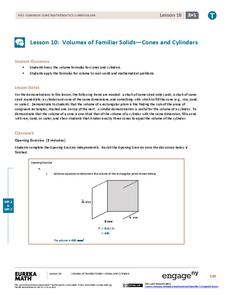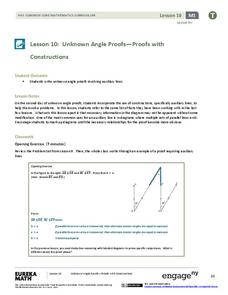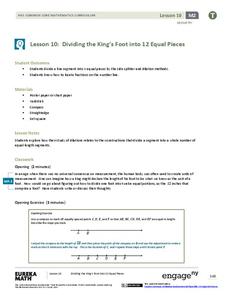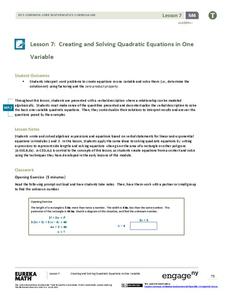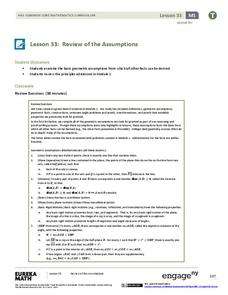EngageNY
Volume of Composite Solids
Take finding volume of 3-D figures to the next level. In the 22nd lesson of the series, learners find the volume of composite solids. The lesson the asks them to deconstruct the composites into familiar figures and use volume formulas.
EngageNY
Interpreting Division of a Fraction by a Whole Number—Visual Models
Divide fractions just like a model does. Pupils visualize the division of a fraction by a whole number by creating models. Scholars make the connection between dividing by a whole number and multiplication before practicing the skill...
EngageNY
Factoring Expressions
Factor in an informative resource when teaching about factoring. The 11th activity in a 36-part module shows pupils how to factor algebraic expressions by applying the distributive property. Some of the problems involve expressions with...
EngageNY
Comparing Rational Expressions
Introduce a new type of function through discovery. Math learners build an understanding of rational expressions by creating tables and graphing the result.
EngageNY
Introduction to Simultaneous Equations
Create an understanding of solving problems that require more than one equation. The lesson introduces the concept of systems of linear equations by using a familiar situation of constant rate problems. Pupils compare the graphs of...
EngageNY
Ratios II
Pupils continue the study of ratios by creating ratios from a context. The contexts present more than two quantities, and scholars create contexts that match given ratios.
EngageNY
Volumes of Familiar Solids – Cones and Cylinders
Investigate the volume of cones and cylinders. Scholars develop formulas for the volume of cones and cylinders in the 10th lesson of the module. They then use their formulas to calculate volume.
Curated OER
Advanced Art – Cultural Place-setting Still life
Upper graders view a series of films that depict rituals or celebrations as they occur in different cultural settings. They conduct a cultural investigation about one culture, brainstorm and research objects that have cultural or...
Curated OER
Ready-Set-Tech: When a Volcano Erupts
Wouldn't it be a blast to uncover the science behind volcanic eruptions? Explore, research, and examine the nature of volcanoes with three fun hands-on projects kids will love. First the class takes to the Internet to research volcanoes....
EngageNY
Prove the Pythagorean Theorem Using Similarity
Amaze your classes with the ability to find side lengths of triangles immediately — they'll all want to know your trick! Learners use the Pythagorean Theorem and special right triangle relationships to find missing side lengths.
EngageNY
Structure in Graphs of Polynomial Functions
Don't allow those polynomial functions to misbehave! Understand the end behavior of a polynomial function based on the degree and leading coefficient. Learners examine the patterns of even and odd degree polynomials and apply them to...
EngageNY
Translating Graphs of Functions
If you know one, you know them all! Parent functions all handle translations the same. This lesson examines the quadratic, absolute value, and square root functions. Pupils discover the similarities in the behavior of the graphs when...
EngageNY
Stretching and Shrinking Graphs of Functions
Why is that graph wider? Pupils learn about stretching and shrinking graphs of square root, absolute value, cubic, and quadratic functions. They study both vertical and horizontal stretches and shrinks in addition to reflections.
EngageNY
Graphs of Functions and Equations
Explore the graphs of functions and equations with a resource that teaches scholars how to graph functions as a set of input-output points. They learn how the graph of a function is the graph of its associated equation.
EngageNY
Comparing Ratios Using Ratio Tables
Decide which concentration of mixtures is the strongest. Pupils use tables to compare ratios involved in mixtures. They use two methods to make the comparisons — by finding equivalent values within the tables or by comparing the...
Glacier Peak High School
Huckleberry Finn Theme Project Ideas
Looking for a project list to conclude a study of The Adventures of Huckleberry Finn? The six suggestions included in the menu (a song, thematic box, CD case, book jacket, blog, scene) could be assigned to individuals or groups....
EngageNY
Unknown Angle Proofs—Proofs with Constructions
Provide your emerging mathematicians with the tools to learn as they incorporate auxiliary lines to solve unknown angle proofs in this continuing segment. They decipher information from a diagram to uncover the missing pieces and...
EngageNY
Dividing the King’s Foot into 12 Equal Pieces
Apply, apply, apply! A measurement lesson applies a number of concepts to help learn a new construction. Scholars learn to divide a segment into n equal parts using a method that uses the Side Splitter Theorem and a method that...
EngageNY
Calculating Conditional Probabilities and Evaluating Independence Using Two-Way Tables (part 2)
Without data, all you are is another person with an opinion. Show learners the power of statistics and probability in making conclusions and predictions. Using two-way frequency tables, learners determine independence by analyzing...
EngageNY
Using the Quadratic Formula
What is the connection between the quadratic formula and the types of solutions of a quadratic equation? Guide young mathematicians through this discovery as they use the discriminant to determine the number and types of solutions,...
EngageNY
Complex Number Division 1
Conjugating in the math classroom — and we're not talking verbs! The seventh lesson in a series of 32 introduces the class to the building blocks of complex number division. During the instruction, the class learns to find the...
EngageNY
Creating and Solving Quadratic Equations in One Variable
Give your classes practice at modeling using quadratic models with a resource that uses area and integer problems to allow individuals to create second degree polynomials. Young mathematicians solve equations using factoring and then...
EngageNY
Matrix Multiplication and Addition
To commute or not to commute, that is the question. The 26th segment in a 32-segment lesson focuses on the effect of performing one transformation after another one. The pupils develop the procedure in order to multiply two 2 X 2...
EngageNY
Review of the Assumptions (part 1)
What was the property again? Tired of hearing this from your pupils? Use this table to organize properties studied and as a reference tool for individuals. Learners apply each property in the third column of the table to ensure their...








